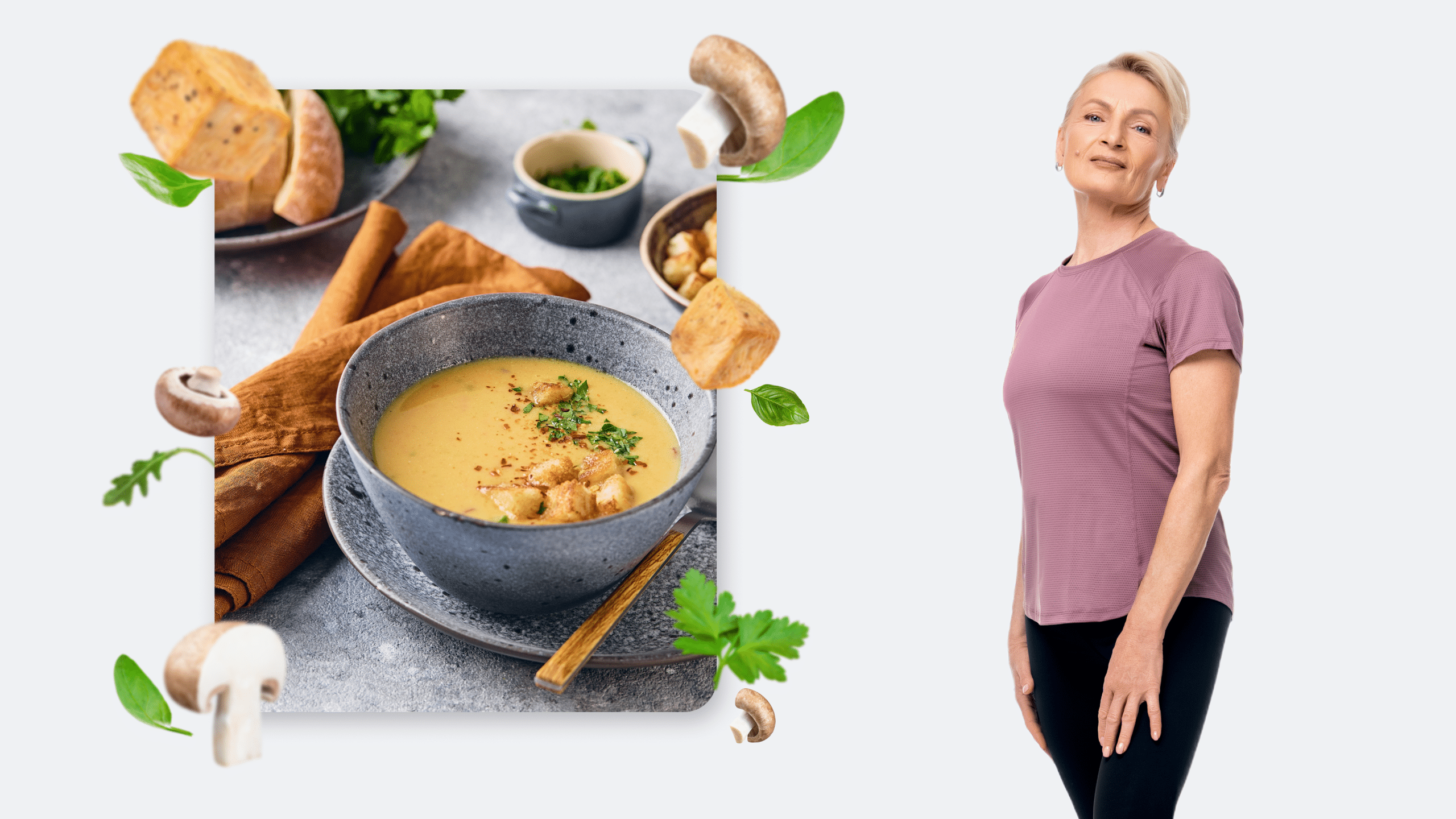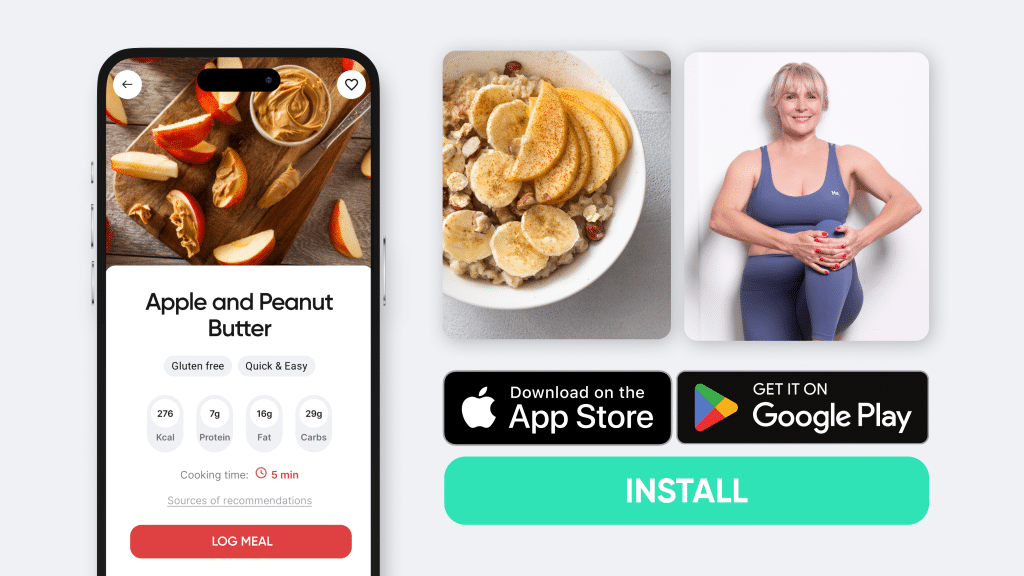One of the main criticisms of the vegan diet and vegan intermittent fasting meal plan is the potential for nutrient deficiencies. Nutrients like iron, calcium, and vitamin B12 are more commonly found in animal products and can be harder to obtain on a vegan diet (1).
However, with proper planning and knowledge of plant-based sources of these nutrients, a vegan diet can provide all the necessary vitamins and minerals for optimal nutrition.
Intermittent fasting is a popular eating pattern that involves alternating between periods of eating and fasting. It has been suggested to have numerous health benefits, such as improved insulin sensitivity, weight loss, and increased autophagy (the body’s natural process of cellular repair) (2).
Combining intermittent fasting with a well-planned vegan diet may provide even more health benefits.
Here is a 7 day vegan intermittent fasting plan that focuses on providing adequate nutrition while still reaping the benefits of intermittent fasting.
Can You Intermittent Fast on A Vegan Diet?
You can fast on a vegan diet. So, a vegan intermittent fasting meal plan is possible.
Intermittent fasting is only an eating pattern; it doesn’t specify what foods you can or cannot eat. As long as your meals during the feeding periods consist of plant-based, whole foods, you can still reap the possible benefits of intermittent fasting while following a vegan diet (3).
In fact, many vegans naturally follow an intermittent fasting pattern without even realizing it due to their food choices and eating habits. For example, someone who eats dinner at 7pm and then doesn’t eat anything until breakfast at 8am the next day has completed a 13-hour fast.
Vegans can choose from several popular intermittent fasting methods such as the 16/8 method, where you fast for 16 hours and eat within an 8-hour window, or the alternate day fasting method where you eat normally one day and then fast for a full 24 hours the next day.
Read more: Building Muscle With Intermittent Fasting: What You Need to Know
What Should Vegetarians Eat when Intermittent Fasting 16:8?
Vegans should eat nutritious, plant-based foods during their feeding periods while intermittent fasting.
Vegan Intermittent Fasting Meal Plan
For the 16/8 method specifically, it’s important to have a well-rounded meal that provides all necessary nutrients within the 8-hour window. Here are some of nutrient dense foods that vegans can choose from when meal planning:
Legumes
Legumes are pivotal in a vegan diet due to their rich content of protein, iron, and fiber. They provide essential amino acids, which are crucial for muscle repair and energy production. Beans, lentils, or chickpeas are great options (4).
Nuts and Seeds
Nuts and seeds are exceptional sources of healthy fats, protein, and fiber. Almonds, chia seeds, flaxseeds, and hemp seeds each bring unique nutritional benefits to the table.
Flaxseeds and chia seeds, in particular, are high in omega-3s, which support heart and brain health. Including a variety of nuts and seeds in your diet can enhance overall wellness and provide essential nutrients that support numerous bodily functions (5).
Tofu and Tempeh
Tofu and tempeh are soy-based proteins that offer additional nutritional benefits such as calcium and iron (6). These versatile ingredients can be used in a wide range of dishes, making them a staple for those seeking to meet their protein needs. Their ability to absorb flavors and complement different cuisines makes them favorites in many vegan recipes.
Leafy Greens
Leafy greens like spinach, kale, and collard greens are loaded with calcium, iron, and vitamins A, C, and K. These nutrients are fundamental for supporting bone health, immune function, and overall vitality (7).
Reasons why BetterMe is a safe bet: a wide range of calorie-blasting workouts, finger-licking recipes, 24/7 support, challenges that’ll keep you on your best game, and that just scratches the surface! Start using our app and watch the magic happen.
Whole Grains
Whole grains such as quinoa, brown rice, and oats are rich in fiber, B vitamins, and minerals like magnesium and iron. These play a crucial role in maintaining energy levels and digestive health. They have a high satiety factor, making them an excellent option for those looking to feel full and satisfied during their fasting periods (8).
Fortified Foods
Fortified foods are vital for obtaining nutrients like vitamin B12, vitamin D, and calcium, which are often less abundant in a vegan diet. Plant-based milks and cereals can be excellent sources of these nutrients, while nutritional yeast adds a cheesy flavor to dishes and provides a boost of B12 (9).
Fruits
Fruits such as berries, oranges, and bananas are packed with antioxidants, vitamins, and minerals. Berries, for example, are especially high in vitamin C and antioxidants, which are important for immune health and reducing inflammation (10).
Sea Vegetables
Sea vegetables like nori, wakame, and dulse are excellent sources of iodine, a nutrient important for thyroid function. They also offer a range of other nutrients, including magnesium and calcium. Incorporating sea vegetables into a vegan diet can enhance nutritional diversity and introduce unique textures and flavors (11).
Avocados
Avocados are rich in healthy monounsaturated fats, which support heart health. They also provide fiber, folate, and potassium, making them not only a nutritious addition to meals but also a versatile ingredient that can be used in a variety of dishes, from salads to smoothies (12).
Mushrooms
Mushrooms, particularly varieties like shiitake, are good sources of vitamin D, especially when they’ve been exposed to sunlight. They also offer B vitamins and antioxidants, contributing to overall health and vitality (13).
What Is The Best Vegan Intermittent Fasting Meal Plan?
The best vegan intermittent fasting meal plan is one that meets the individual’s nutritional needs and lifestyle. It’s important to consult with a healthcare professional or registered dietitian before starting any new eating pattern, especially if you have any underlying health conditions.
Read more: How Long Is It Safe To Fast: Are Long Or Short-Term Fasts More Effective?
Here’s a sample 7 day vegan intermittent fasting meal plan to give you an idea of how it can be structured. This meal plan assumes a 16/8 fasting schedule, where you fast for 16 hours and eat within an 8-hour window.
Day 1
- 11am (Feeding period begins): Avocado toast on whole grain bread with a side of fresh fruit
- 3pm: Snack – Berry smoothie made with plant-based milk and chia seeds
- 6pm: Vegan chili with beans, vegetables, and tofu served over brown rice
- 7pm (Feeding period ends): Herbal tea or water
Day 2
- 11am (Feeding period begins): Overnight oats made with almond milk, topped with banana slices and walnuts
- 3pm: Snack – Sliced cucumber and hummus
- 6pm: Stir-fried tempeh with broccoli, bell peppers, and brown rice
- 7pm (Feeding period ends): Chamomile tea or water
Day 3
- 11am (Feeding period begins): Smoothie bowl with spinach, avocado, and mixed berries, topped with granola and pumpkin seeds
- 3pm: Snack – Apple slices with almond butter
- 6pm: Quinoa salad with chickpeas, cherry tomatoes, cucumber, and a lemon-tahini dressing
- 7pm (Feeding period ends): Green tea or water
Day 4
- 11am (Feeding period begins): Whole grain waffles with berry compote and a handful of almonds
- 3pm: Snack – Carrots and celery sticks with guacamole
- 6pm: Lentil curry with spinach, served with quinoa
- 7pm (Feeding period ends): Peppermint tea or water
Day 5
- 11am (Feeding period begins): Breakfast burrito with tofu scramble, black beans, avocado, and salsa wrapped in a whole wheat tortilla
- 3pm: Snack – Mixed nuts and dried cranberries
- 6pm: Roasted vegetable and chickpea buddha bowl topped with tahini dressing
- 7pm (Feeding period ends): Lemon ginger tea or water
Day 6
- 11am (Feeding period begins): Chia pudding made with coconut milk, topped with kiwi and pomegranate seeds
- 3pm: Snack – Whole grain crackers with vegan cheese
- 6pm: Mushroom risotto with peas and asparagus
- 7pm (Feeding period ends): Hibiscus tea or water
Day 7
- 11am (Feeding period begins): Whole grain toast topped with smashed avocado, tomato slices, and nutritional yeast
- 3pm: Snack – Fresh orange slices and almond yogurt
- 6pm: Vegan sushi rolls with nori, cucumber, avocado, and red pepper
- 7pm (Feeding period ends): Rooibos tea or water
Notes:
- Make sure to stay hydrated throughout the day with plenty of water or herbal teas.
- Adjust portion sizes based on individual needs and activity levels.
- This meal plan is just a suggestion and can be modified to fit personal preferences and ingredient availability.
What Foods to Avoid on 16:8 Intermittent Fasting?
When following a 16/8 intermittent fasting schedule, it’s important to avoid consuming any food or calories during the fasting period. This includes drinks such as juices, smoothies, and even coffee with plant milk or sugar (although some people may choose to have sugarless black coffee or tea during the fast).
It’s also important to limit or avoid ultra processed and high-fat foods during the feeding period, as these can be detrimental to overall health when consumed in excess (14). Instead, focus on incorporating whole, plant-based foods that are nutrient-dense and provide sustained energy throughout the day (15).
When it comes to weight loss, progress is made by inches, not miles, so it’s much harder to track and a lot easier to give up. The BetterMe: Health Coaching app is your personal trainer, nutritionist, and support system all in one. Start using our app to stay on track and hold yourself accountable!
What Is the 2 Meal Day Diet for Intermittent Fasting?
The 2 Meal Day Diet encourages eating two substantial meals a day, focusing on whole foods, and avoiding calorie counting, making it known as a lifestyle rather than a short-term diet.
It’s a form of intermittent fasting similar to the 16:8 method, where you fast for 16 hours and eat within an 8-hour window. However, it emphasizes eating only when you feel hungry rather than strictly adhering to a clock. It’s purported to help individuals reconnect with their body’s natural hunger signals, potentially leading to sustainable weight loss, improved energy levels, and better overall health.
We discussed the Types Of Vegetarian Diet and their respective merits in regard to weight loss.
What Is the Best Intermittent Fasting Window to Lose Belly Fat?
The best intermittent fasting window to lose belly fat is the one you can maintain consistently over time. Some may find that shortening their eating window to 4-6 hours a day, while others may prefer the 8-hour feeding window. The key is to find what works best for your body and lifestyle.
In terms of research, a 2017 study found that alternate-day fasting (where individuals ate normally one day and then followed a very low-calorie diet the next) resulted in an improvement in the ratio of fat-free mass to body fat over a 24 week period (16). However, this method may not be sustainable for some people, and the results were similar in people who simply reduced their calorie intake every day, rather than fasting.
Ultimately, the most effective way to lose belly fat with intermittent fasting is to combine it with a healthy, balanced diet and regular exercise routine. This will help promote overall weight loss and support fat reduction in the abdominal area, as well as the rest of the body.
Try this Vegan Smoothies For Weight Loss for healthy low calorie drinks to supplement your weight loss efforts.
Losing 2 kg in a week is a lofty goal. It’s usually recommended to aim to lose 1-2 pounds (roughly 0.5-1 kg) per week with any weight loss strategy. To lose any amount of weight in a week with intermittent fasting, you need to create a calorie deficit by combining fasting with a healthy, balanced diet and physical activity. Choose a fasting method like the 16:8, which involves fasting for 16 hours and eating during an 8-hour window. Focus on nutrient-dense, low-calorie foods such as vegetables, lean proteins, and whole grains during your eating periods. Incorporate regular exercise, including both cardio and strength training, to increase calorie burn. It’s important to maintain a sustainable and healthy approach, as rapid weight loss can sometimes be difficult to maintain. If you’re not losing weight on the 16:8 fasting method, consider evaluating your calorie intake and food choices during your eating window. Consuming more calories than your body burns can impede weight loss, even with fasting. Pay attention to portion sizes and avoid high-calorie, high added-sugar foods. Additionally, make sure you’re getting enough sleep and managing stress, as both factors can affect weight loss (17). Monitor your progress and make adjustments to your diet and exercise routine if necessary. The hardest intermittent fasting method is often considered to be the “alternate-day fasting” approach, where individuals alternate between fasting days and eating days. On fasting days, calorie intake is significantly restricted, sometimes only allowing for non-caloric beverages and minimal calorie consumption. This method can be challenging due to its strict nature and the potential for intense hunger on fasting days. It requires strong discipline and as such may not be suitable for everyone. Several actions won’t ruin intermittent fasting, such as consuming non-caloric beverages like water, black coffee, and unsweetened tea during fasting periods. These drinks do not break a fast as they contain no or negligible calories and can help keep hunger at bay. Light physical activities, like walking or yoga, also won’t interfere with fasting. It’s important to avoid consuming any caloric foods or beverages during fasting hours to maintain the fasting state and its potential benefits.Frequently Asked Questions
How To Lose 2kg In A Week With Intermittent Fasting?
Why Am I Not Losing Weight On 16:8 Fasting?
What Is The Hardest Intermittent Fasting?
What Doesn’t Ruin Intermittent Fasting?
Conclusion
Intermittent fasting might offer several health benefits for vegans, including enhanced weight management, improved insulin sensitivity, and potential longevity benefits. By incorporating nutrient-dense plant-based foods into your diet during the feeding window, you can nourish your body while still reaping the potential benefits of intermittent fasting.
If you’re considering trying intermittent fasting, be sure to consult a healthcare professional and listen to your body’s needs. With the right approach, it can be an effective tool for maintaining a healthy and balanced vegan lifestyle.
DISCLAIMER:
This article is intended for general informational purposes only and does not serve to address individual circumstances. It is not a substitute for professional advice or help and should not be relied on for making any kind of decision-making. Any action taken as a direct or indirect result of the information in this article is entirely at your own risk and is your sole responsibility.
BetterMe, its content staff, and its medical advisors accept no responsibility for inaccuracies, errors, misstatements, inconsistencies, or omissions and specifically disclaim any liability, loss or risk, personal, professional or otherwise, which may be incurred as a consequence, directly or indirectly, of the use and/or application of any content.
You should always seek the advice of your physician or other qualified health provider with any questions you may have regarding a medical condition or your specific situation. Never disregard professional medical advice or delay seeking it because of BetterMe content. If you suspect or think you may have a medical emergency, call your doctor.
SOURCES:
- Intake and adequacy of the vegan diet. A systematic review of the evidence (2021,nih.gov)
- Intermittent Fasting: Exploring Approaches, Benefits, and Implications for Health and Weight Management (2024,npjournal.org)
- Awareness of plant-based diets and intermittent fasting: A cross-sectional among college-aged students in Kuwait (2023,researchgate.net)
- Legumes: Health Benefits and Culinary Approaches to Increase Intake (2015,nih.gov)
- Composition of Nuts and Their Potential Health Benefits—An Overview (2023,nih.gov)
- Soy (2023,medlineplus.gov)
- HEALTH BENEFITS OF LEAFY GREENS (2022,baptisthealth.com)
- Health Benefits of Dietary Whole Grains: An Umbrella Review of Meta-analyses (2017,nih.gov)
- Nutritional Benefits of Fortification (2024,fwg-alliance.org)
- Whole Fruits and Fruit Fiber Emerging Health Effects (2018,nih.gov)
- What to Know About Sea Vegetables (2022,webmd.com)
- Hass Avocado Composition and Potential Health Effects (2013,nih.gov)
- Edible Mushrooms: Improving Human Health and Promoting Quality Life (2015,nih.gov)
- Processed Foods and Health (2023,harvard.edu)
- Embracing a plant-based diet (2021,stanford.edu)
- Effects of alternate-day fasting or daily calorie restriction on body composition, fat distribution, and circulating adipokines: Secondary analysis of a randomized controlled trial (2018,sciencedirect.com)
- Weight-Loss and Maintenance Strategies (2003,nih.gov)











